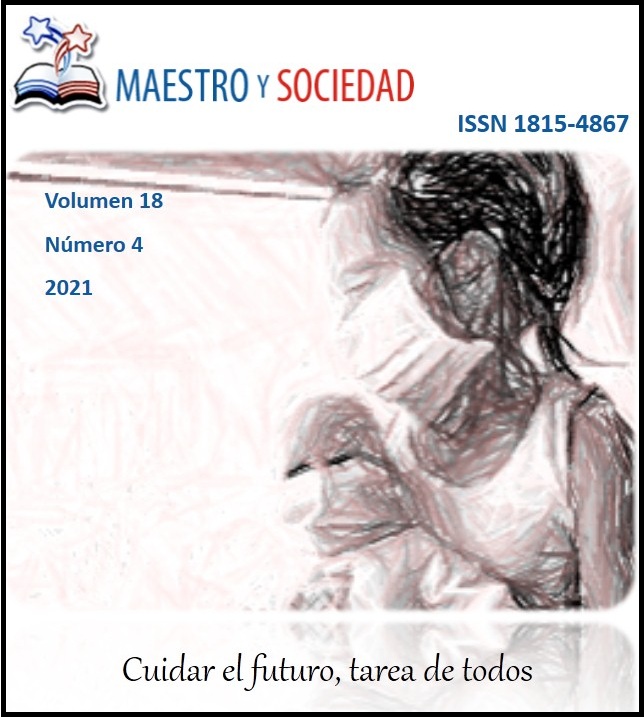Effect of educational tutoring in the self-esteem in peruan´s students of primary education
Array
Keywords:
Self-esteem development, Educational tutoring, Personal development, Academic developmentAbstract
This research aimed to determine the effect of educational tutoring on children students of primary education at Educational Institution of Pucallpa, Perú. A mixed methodology was used to address the object of study, highlighting the methods of observation, documentary analysis and non-parametric statistics, integrated into a quasi-experimental design. The level of self-esteem in the Pre – test on improving self-esteem in the experimental group most children (85.7%), have a low average self-esteem and in the control group most children (52.4%) they have low self-esteem. While in the post test in the experimental group most children (57.1%), they show high average self-esteem. On the other hand, in the control group (90.5%) have low average self-esteem. This is confirmed by the hypothesis test that was significant as indicated by the tabulated t > 0.05, therefore the mentoring program was significant in improving self-esteem in the experimental group.
References
Arakaki, M., & Muñoz, R. (2020). Percepciones de tutores sobre la incorporación de las TIC al programa de tutoría de la Facultad de Psicología PUCP. En Blanco y Negro, 11(1), 1-13.
Atalaya Cacha, C.E. (2018). Estrategias didácticas para el desarrollo de la tutoría y orientación educativa. Teoría Educativa, 21, 16-28.
Chávez, W.O., Ortega, F.P., Pérez, J.K., Zúñiga, E.J., & Rivera, A. R. (2021). Modelo ecológico de Bronferbrenner aplicado a la pedagogía. Infinite Study.
Cid, P., Orellana, A., & Barriga, O. (2010). Validación de la escala de autoeficacia general en Chile. Revista médica de Chile, 138(5), 551-557.
Chero Nieves, M.J. (2020). Análisis descriptivo del modelo de tutoría de la JEC. Ediciones del Ministerio de Educación del Perú.
García López, R.I., Cuevas Salazar, O., Vales García, J.J., & Cruz Medina, I. R. (2012). Impacto del Programa de Tutoría en el desempeño académico de los alumnos del Instituto Tecnológico de Sonora. Revista electrónica de investigación educativa, 14(1), 106-121.
Hernández, N.B., & Izquierdo, N.V. (2018). Validación teórica de la estrategia para el desarrollo de la competencia emprender como contribución a la formación integral del estudiante de la educación preuniversitaria. Revista de Investigación e Innovación, 3(3), 103-116.
Jiménez, D., Mayorga, J.A., Ubilla, M., & Hernández, N. (2021). NeutroAlgebra for the evaluation of barriers to migrants’ access in Primary Health Care in Chile based on Prospector function. Neutrosophic Sets and Systems, 39(1), 1-9.
Martínez, G. (2020). Inteligencia Interpersonal y tutoría de los estudiantes del VII ciclo de una Institución Educativa Publica, 2018. Revista of Business and Entrepreneurial Studies, 33, 73-82.
Minedu. (2007). Guía de diversificación curricular. Gráfica Navarrete.
Polo, A., & Vilcanqui, B. M. (2021). Motivación y desarrollo de habilidades en Investigación Formativa: Un análisis desde la Estadística Neutrosófica. Infinite Study.
Ravello Bravo, C.M. (2007). Manual de Tutoría y Orientación Educativa. Infinite Study.
Torrecilla Sánchez, E.M., Rodríguez Conde, M.J., Herrera García, E., & Martín Izard, J.F. (2013). Evaluación de calidad de un proceso de tutoría de titulación universitaria: la perspectiva del estudiante de nuevo ingreso en educación. Quality Evaluation of the Tutoring Process, 19, 34-43.
Vargas Arévalo, M.E. (2020). Análisis de los contenidos temáticos sobre educación sexual en los textos del área de tutoría 2005-2014. Ediciones del Ministerio de Educación del Perú.
Published
How to Cite
Issue
Section
License
This journal provides immediate open access to its content, based on the principle that offering the public free access to research helps a greater global exchange of knowledge. Each author is responsible for the content of each of their articles.



























 Universidad de Oriente
Universidad de Oriente 